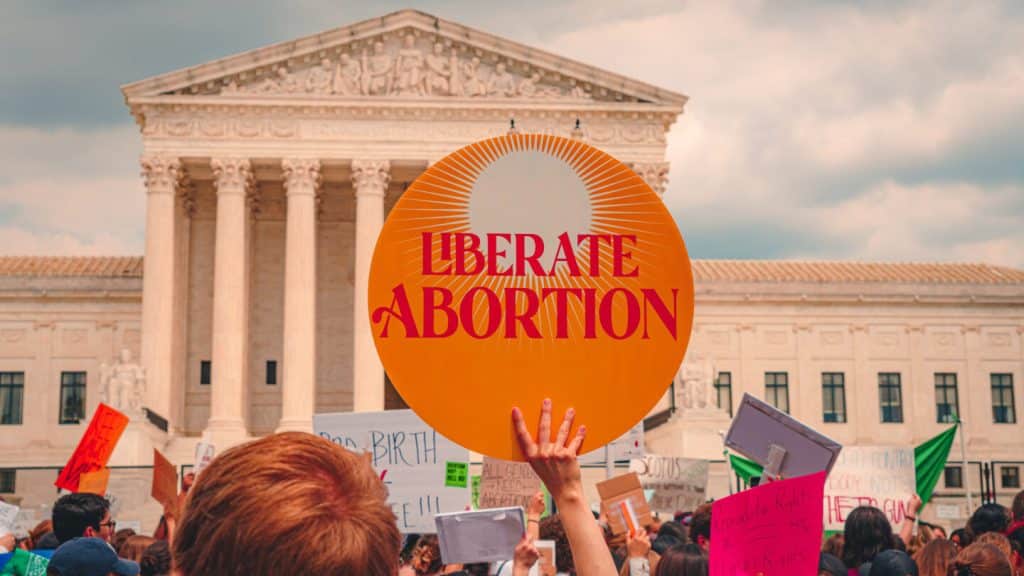Photo: Overturn of Roe v Wade - The Organization for World Peace
The outcome of the US presidential election will not only be felt within the borders of the United States; the consequences will reach worldwide. The stakes are particularly high when it comes to abortion rights and reproductive health care. A re-election of Donald Trump could endanger the lives of millions of women by again cutting off crucial US financial support - a move reminiscent of Trump's policies his previous term. If he returns to power, a reintroduction of these measures threatens, which will send a powerful message to reproductive health providers: they are once again faced with the choice between vital US funding and the freedom to defend reproductive rights and access to abortion.
The Global Gag Rule
The danger lies in the possibility of the reintroduction of the so-called ''Global Gag Rule' (GGR), also known as the 'Mexico City Policy' and renamed the 'Protecting Life in Global Health Assistance Policy' during Trump's previous term. This policy, originally in 1984 introduced by President Ronald Reagan, requires foreign organisations receiving US funding to refrain from performing, promoting or informing about abortion. Even if these organisations fund abortion services with their own resources, they risk losing US support if they fail to comply with the GGR. Every president since Reagan has revised or repealed the policy, making NGO funding vulnerable to political change in the US.
Under Trump, however, the GGR was greatly expanded. Whereas previously it applied only to family planning organisations, under Trump it was extended to virtually all US global health funding, amounting to some $12 billion. Moreover, in 2019, subcontractors and local partners of affected NGOs were also subjected to the GGR. This also brought social programmes under pressure, from HIV/AIDS prevention to education for LGBTQ communities and cervical cancer screening. There are rumours that Trump even wants to decide in a subsequent term to include all US foreign aid, including humanitarian aid, under the GGR, which would affect $51 billion in aid worldwide.
Substantial damage from the GGR
The effects of the GGR are undeniable and hit low-income countries particularly hard. In countries like Ethiopia and Uganda, which rely heavily on US aid, health organisations saw a decrease in mobile services and less support from local facilities, seriously impacting family planning provision. Even in countries where abortion is legal, such as Nepal, the sector is experiencing damage: the Family Planning Association Nepal (FPAN) lost millions in funding from the GGR, with the result that their services are almost halved is. Vulnerable groups, including adolescent girls, LGBTQ communities and people living with HIV and AIDS, are particularly hard hit by GGR. Every year, millions of adolescent girls worldwide face the risk to an unplanned pregnancy and unsafe abortion. In many low- to middle-income countries, they lack adequate education and contraceptive resources. This loss forces women, especially from marginalised communities, to unsafe, illegal abortions or unwanted pregnancies.
Reinforcing a culture of silence
The impact of the GGR goes beyond financial constraints. By creating confusion and reinforcing anti-abortion sentiments, the rule creates a culture of silence around abortion, making information about abortion increasingly difficult to obtain in many countries. This culture of silence once again reinforces the stigma around abortion and gives anti-abortion activists worldwide new momentum. Many organisations and healthcare providers no longer dare to give referrals to safe abortion services or cease their activities, fearing the loss of crucial funding, even if the GGR does not technically apply to countries and governments.
The irony of the GGR
In addition, the GGR's original goal of reducing abortions is proving ineffective in practice. According to the WHO limited access to contraception and information about abortion actually leads to an increase in unintended pregnancies. Indeed, for many women in vulnerable countries, the need for abortion is a necessity, not a choice, and regardless of the obstacles, they will continue to seek ways to end an unwanted pregnancy. Ironically, as a result, the GGR may even lead to a increase of abortions worldwide, as women fall back on unsafe methods in desperation. Such as Carole Sekimpi, senior Africa director of MSI Reproductive Choices, stressed: "Trump needs to recognise that this policy puts women's lives at risk."
Vicious circle of funding
The unpredictable and volatile nature of the GGR complicates long-term planning and cripples partnerships. The continuous pulling in and out of the GGR, depending on the political leanings of the incumbent president, creates gaps in the health system. Crucial programmes can be interrupted and staff and resources can disappear as a result. Dependence on US funding, as the US is the largest donor in this sector, makes it almost impossible for NGOs to absorb these losses. Family planning organisations are thus caught in a cycle of funding and defunding. You cannot simply stop the health system in four years and then rebuild it without any problems; next time you have to start from scratch again, says Tushar Niroula, executive director of MSI Nepal.
Choice for the future
So the choice Americans will soon be making offers them the chance to determine whether their government puts political games above the lives of women and girls. Will they pursue the course that puts change and security first, or will they restrict health care? The answer to that question will become clear in the coming week, with consequences that will be felt worldwide. Time is running out; the eyes of the world are on them.




